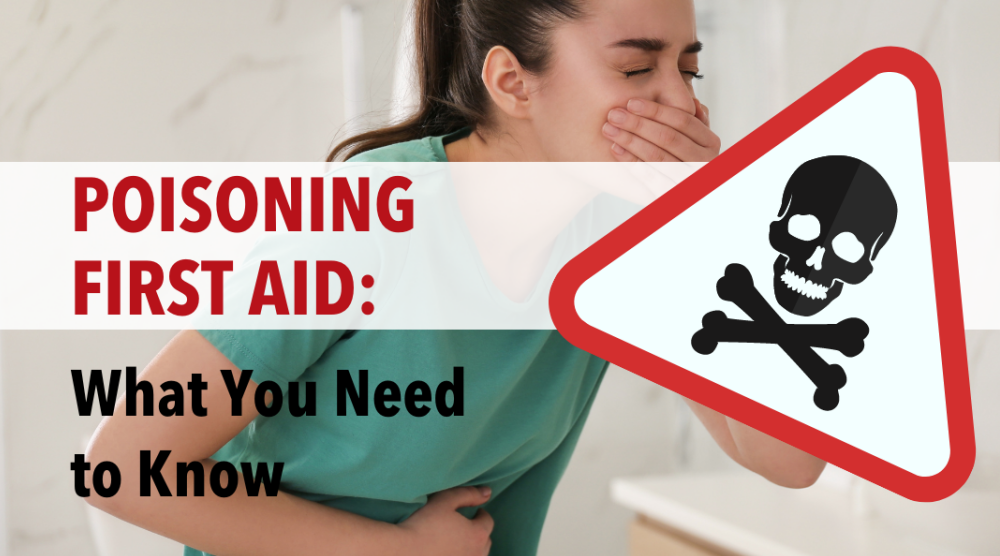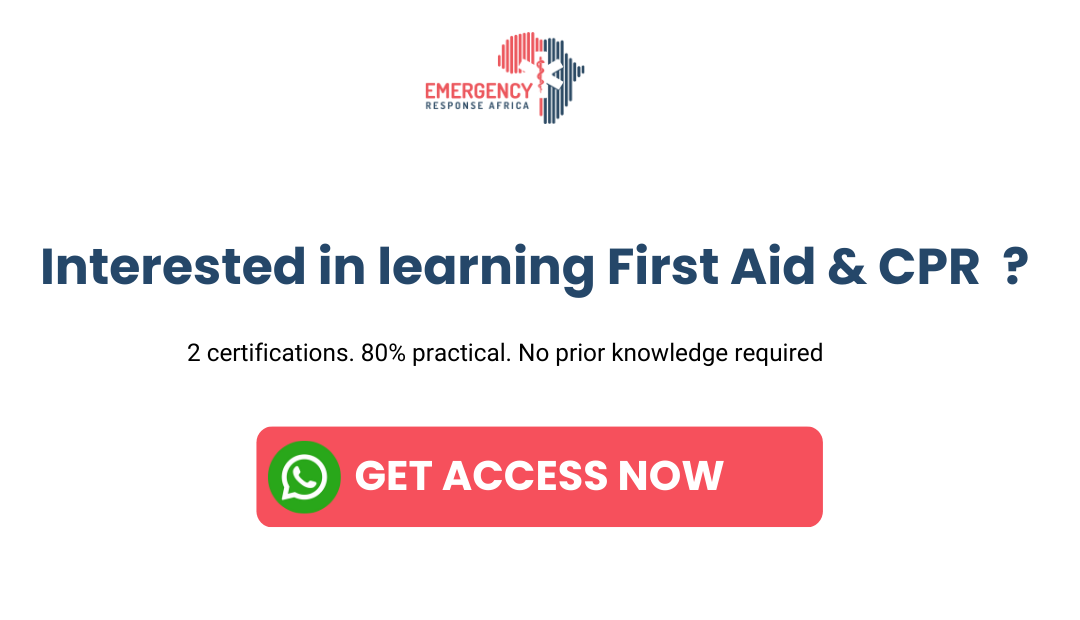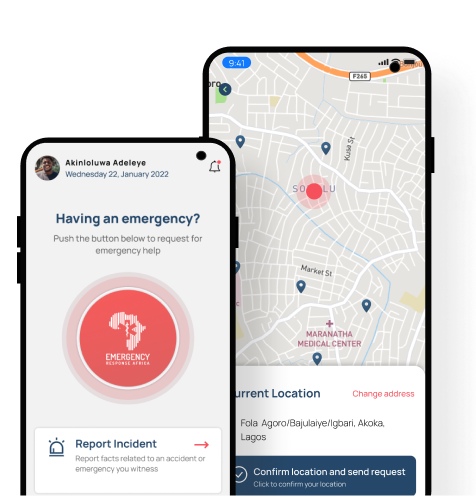Poisoning commonly occurs due to ingestion, but it can also result from injection, inhalation, and exposure to body surfaces, such as the skin. Poisoning may be accidental or intentional and can occur in many different forms, such as chemicals, alcohol, drugs, common plants, and household items. First aid treatment for poisoning if you suspect one is to call emergency response service first.
What is Poisoning?
Harmful substance exposure to the body causes poisoning. It can be due to swallowing, injecting, breathing, or other means. Most poisonings occur by accident.
Some poisons can be obvious and marked (Hazardous chemicals, for example), but others can be harder to spot, including the leaves or berries of some plants or fungi. To prove our point earlier, many non-food substances that are ingested are generally non-toxic. However, almost any substance can become toxic if taken in excessive, unhealthy amounts.
Ingested poison can bring damage by altering a person’s cellular metabolism in a harmful or destructive way. Depending on the substance intake, it can act quickly or develop over time.
Immediate first aid treatment for poison is very important as it can help save the person’s life before an emergency response arrives. If your child is poisoned, you must rush the child to the hospital for emergency medical care immediately.
Symptoms and Signs of Poisoning
Some signs and symptoms of poison are disguised as other conditions in the body. Realize that the body reacts to different chemicals in the body.
So, the common signs and symptoms of poison in the body include Abdominal pain, chest pain, cough, dizziness, double vision, fever, headache, nausea and vomiting, drowsiness, breath odour, coma, seizure, loss of bladder control, general body weakness, numbness, muscle twitching, etc.
If a person is suspected of swallowing or ingesting a poison, be alert for clues. Look for empty pill bottles and packages, or check for signs of burns, stains, and other signs on the person.
With small children, consider the possibility that they may have accidentally taken prescription medications or swallowed a button battery.
RELATED SERVICES
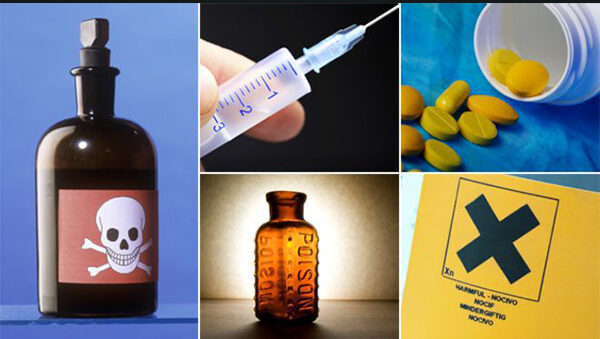
Causes of Poisoning
Causes of poisoning in the body may include inhaled or ingested substances; however, the most common is ingestion of substances that are damaging to the body.
Some examples include;
-
- Insecticides in houses, home paints and Toxic plants are used in indoor and outdoor plants.
- Unhealthy gases include carbon monoxide, car fumes, heavy-duty industrial gas, and engines.
- Chemical overdose) and illicit drugs such as cocaine
- Detergents and some drugs that are sold over the counter, like aspirin and cleaning products, can be abused and poisoned.
First Aid Treatment for Poisoning
The first step is to seek medical help by calling an emergency ambulance or the local emergency response contact.
We stated earlier that poisoning can be both inhaled and swallowed.
1. Poisoning by swallowing
To start with, if the victim was poisoned by swallowing any substance, ensure to do the following:
- Check to see if the victim is breathing and has a pulse; if necessary, start CPR to rescue the breathing of the poison victim.
- Confirm and be sure that the person was poisoned; it may be hard to tell but take note of the surroundings of the person.
- You may see some clues like lousy odour, vomiting on the ground, difficulty breathing, and even the substance on paper, like a drug card or syrup container.
- If the victim has been sick as a result of ingesting a plant part and the victim vomits, keep some sample of the vomit because it will help in the medication and reverse the poisoning.
Then make sure you don’t do the following:
- Make the person throw unless you are asked to do so after calling the ambulance service or local healthcare provider.
- Wait till the emergency response comes in case the person starts convulsion, and give the person first aid for convulsion.
- Leave the clothing that the poison has been spilt on the person; instead, remove it and flush the skin with clean water.
- Keep the person on the floor or chair instead of lying the victim comfortably. Roll on the left side and hold on till the emergency response arrives.
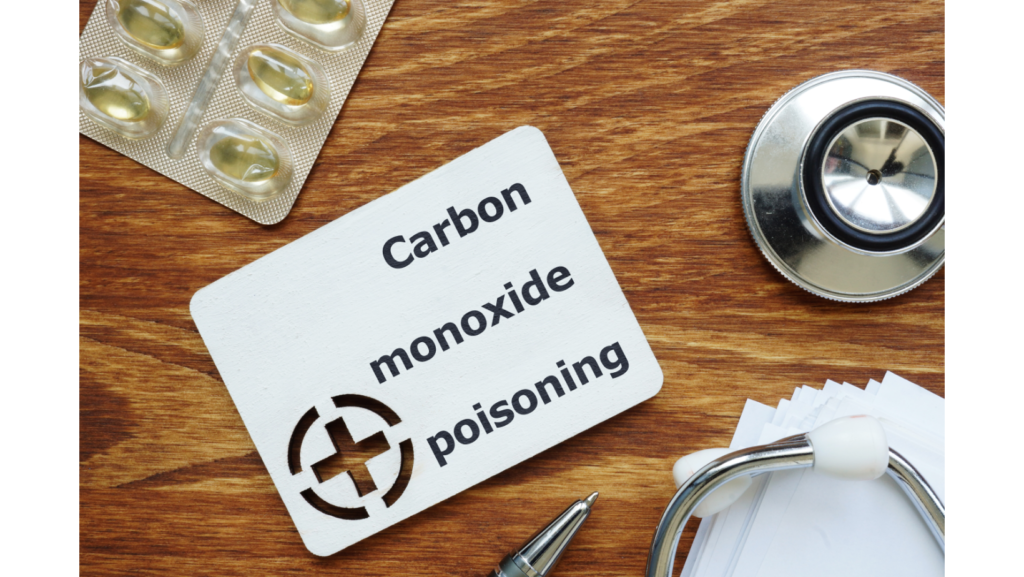
2. For Inhalation poisoning
Call for emergency help. Only attempt to rescue a person after notifying others first. If it is safe for you, take the person to the open air, freeing them from further choking on gas, fumes, or smoke. In other words, break the window so that fresh air can come in if there is no way of escape. Hold your breath, then use a wet material like a towel or cloth to cover your mouth and nose.
- Avoid lighting a match around the area because some gas is flammable.
- Always check the person’s airway after escaping from the fire and, if necessary, do CPR to rescue breathing and bring the person back to life.
- Use water to clean the eyes of the victim just in case the gas entered their eyes.
- In the case where the person vomits, tear the cloth of the person.
Things Not to Do While Waiting for Emergency Response Team
- Refrain from further giving food to the person to eat or drink.
- Vomiting out the substance can be as bad as taking in the substance, except if the medical emergency team doesn’t induce vomiting.
- Neutralize the poison by taking any antidote or medication.
- Wait until symptoms show up before you call for emergency support.
READ ALSO
Poison Prevention and Precaution
Over two million die of poison across less developed countries. So, learning about prevention to prevent first aid treatment for poisoning is vital.
- Store all chemicals from drugs to paints and even cosmetics away from children’s reach and label the cupboard.
- Know all the plants in your home and ensure you remove all toxic plants.
- Educate your children about the dangers of putting substances in their mouths. Check the description of everything they buy.
- Label all non-food cited items in your house, and the ones that poison state it clearly.
- If your environment suffers from air pollution, report it to the respected authorities.
- Use common sense with your medications. Never use another person’s prescribed drugs or medicines that have expired.
RELATED SERVICES
Learn First Aid
Sign up for a first aid course and stay current on current guidelines, health tips, and expertise on managing various health emergencies.
Check out our course page to learn more.
You can also download our First Aid app to get quality resources.
Ensure you’re prepared for common first aid emergencies; learn more: https://emergencyresponseafrica.com/ – and get a class near you.
Enrol for our first aid and CPR service or Contact us at (+234)8085309007 (+234)8089200630 or Email Us – at contact@emergencyresponseafrica.com

